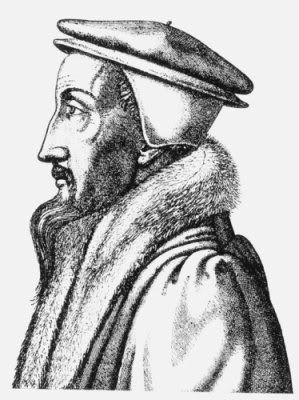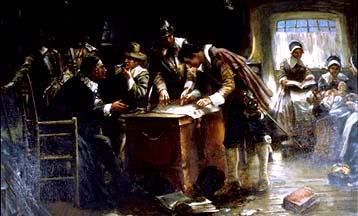[Dumdedumdedum... just updating after a year and a half... probably a waste of time expecting anyone to read it, but this is as much for my own enjoyment as anything else.]
Puritanism
The established Church of England was not, of course, the only denomination to arise out of the Reformation. While most followed the monarchy's (officially Evangelical) line on matters of religion, many followed a theology closer to that of John Calvin. In fact, Calvinism first appeared in England as a force during that theologian's lifetime; during the latter part of the reign of Henry III, Calvin himself corresponded with the king and with Thomas Cranmer. The true seed of Calvinism in England, however, came with Queen Mary's persecutions. Many Protestants fled to Geneva, enough to create a thriving expatriate community, one which Calvin himself became involved with. This community collaborated, under the guidance of Calvin, William Whittingham, and John Spottiswood the Elder, to translate the Bible more thoroughly than previously; the result was the Geneva Bible, completed in 1560, just in time for Elisabeth's revival of Protestantism in Great Britain.

John Calvin, by Rene Boyvin (1562)
Whittingham, Spottiswood, and the other Geneva exiles returned at this time, with their new theology and with manuscripts of the Geneva Bible to prepare for printing. Elisabeth herself was somewhat sympathetic to these ideas, resulting in some editing of the Book of Common Prayer in 1559, though the episcopalian forms of the Church of England won out over the Cavinists' presbyterianism. It was in Scotland, under Spottiswood, that Calvinism took much deeper root; Spottiswood held up the example of John Knox, a Calvinist executed after a rebellion against Queen Mary in 1556. The Confession of Faith of 1650, officially ratified by the Scottish Parliament, displayed this belief in such ideas as total depravity:
BE uhilc transgressioun, commounlie callit originall sin, uaes þe Image of God utterly defacit in man; and he and his posteritie of nature becamen enemeis to God, slauis to Sathan, and seruandis to sin, in sa mecle þat deiþ euerlasting haes had and sall haue pouer and dominion over all þat haue not bene, ar not, or sal noht be, regenerat fra aboue...
- Confession of Faith Ratification Act, iii (Of Originall Syn)
In fact, soon after the first full printing of the Geneva Bible in Britain in 1576, the Scottish Parliament made it law that all Scottish households capable of affording one should have a copy. In England, Calvinism was never quite accepted by the "High Church" authorities promoted by the royal and later imperial government, but the Geneva Bible itself was in wide use, and a thriving "Low Church" with presbyterian forms of worship and theology was completely accepted by the Church of England, and still at that time considered a part of it.
In England, there were two main dividing points within the Calvinist movement. The first was between presbyterianism, which still had a council of church elders directing the various parishes, but no set hierarchy of bishops, and congregationalism, where each church was autonomous and directed matters as it willed. The second division was between the Puritans, who wished to reform the Church of England from within, and Separatists, who felt that the English church was not "redeemed" and thus had to be left. Most of the latter, especially once emperors James and Charles began persecuting them for their opposition to the state church, left for America and settled along the coastline.
Separatists signing the "Mayflower Compact" of 1620, by Edward Percy Moran (1900)
Those Puritans who remained in England were disproportionately represented in the military. Unlike the more pacifist continental groups such as the Anabaptists, the Puritans felt they had little need for non-violence, and the monarchy felt that they could be more sure of being hostile to "Papists", unlike the sometimes pseudo-Catholic Anglican majority. The sack of Canterbury in 1590 was led by the Puritan parts of the army sent to quell the Catholic rebellion there, though certainly most of the more mainstream Protestants within the force were only too happpy to take part in it as well.
Puritan theology, with its emphasis on the total depravity of all humans (and thus their essential moral equality), and opposition to religious hierarchy, actually lent itself to an early promotion of political liberty. Most still had some sense of the landowner-oriented, aristocratic society of the 17th century, but a few radicals, known as "Levellers", developed the idea of "natural rights" given by God to all men, and thus supported suffrage for far more than the British Parliament of the time allowed (though not to the extent of universal male suffrage often misattributed to them).
The differences betwen the Puritans and the established Church of England began to erupt into conflict during the early 17th century. The former felt that the two Borcalan emperors of the time had fallen into practical Papism, thus displaying their lack of divine grace and therefore unfitness to rule. The latter, perhaps in response to such complaints, felt that this group which did not follow the norms of the state church was a danger to national stability. Part of what led to the great Parliamentary revolt against Charles, and the support from the army for it, was his direct opposition to Puritanism. All these different groups - Presbyterians, Congregationalists, Separatists, Levellers, and others - would have a great effect on the Commonwealth set up in England upon the death of Emperor Charles.






